a&e features
The year ahead: 2018
D.C.’s LGBT social calendar filled with prides, dinners, performances and more
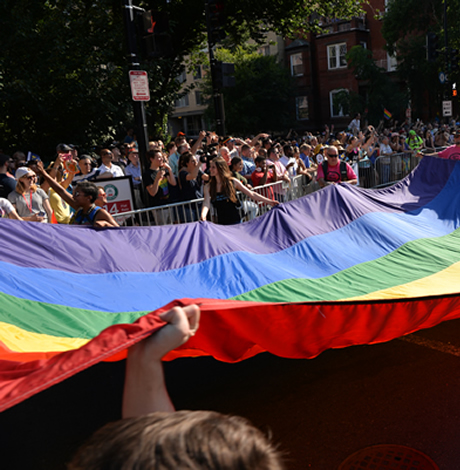
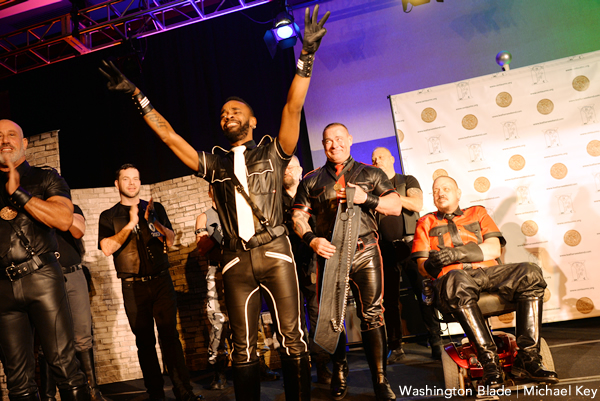
Martel Brown, Jr. won the title of Mr. Mid-Atlantic Leather 2017. (Washington Blade photo by Michael Key)
D.C.’s LGBT scene is filled with events all year long. We’ve compiled a list of what’s coming this year. Details are pending for some events, especially those later in the year. Keep reading the Blade throughout 2018 for updates.
Mid-Atlantic Leather Weekend is Jan. 12-14 at the Hyatt Regency Capitol Hill (400 New Jersey Ave., N.W.). Details at leatherweekend.com.
The Capital Pride Alliance invites LGBT community members to march in the annual MLK Holiday Parade in Anacostia Park (1900 Anacostia Drive, S.E.) on Jan. 15 from 10 a.m.-2 p.m. Visit the Facebook event page for details.
Reel Affirmations has screenings scheduled throughout the year starting with “CatSkin” on Jan. 19. Details and 2018 passes available at reelaffirmations.org.
The Brother Help Thyself grant/awards reception is Jan. 20 at the Baltimore Eagle (2022 N. Charles St.) in Baltimore. Details at brotherhelpthyself.net or on the BHT Facebook page.
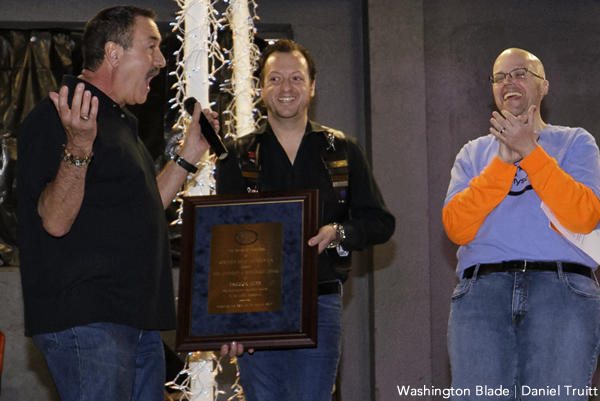
Brother Help Thyself grant awards (Washington Blade photo by Daniel Truitt)
The CAMP Rehoboth Chorus kicks off its 2018 season with “It Takes Two!” Jan. 20 at the CAMP Rehoboth Community Center (37 Baltimore Ave., Rehoboth Beach, Del.). Details at camprehoboth.com.
The Helen Hayes Award nominees will be announced in late January or early February at the National Theatre, based on past scheduling. Details are also pending on the ceremony, which is usually held the first week in April. Check back later at theatrewashington.org.
The Creating Change Conference of the National LGBTQ Task Force is Jan. 24-28 in Washington. Details here.
Wig Night Out, an annual Point Foundation benefit, is scheduled for Jan. 27 from 7-9 p.m. at JR.’s Bar (1519 17th St., N.W.). For details, check here.
Pride Reveal is tentatively set for Thursday, Feb. 1. Details soon at capitalpride.org.
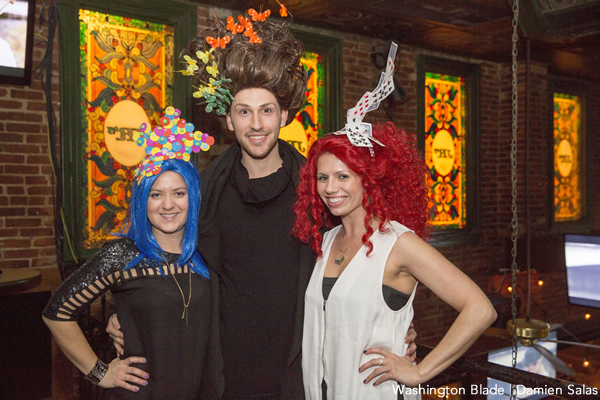
Wig Night Out (Washington Blade photo by Damien Salas)
Equality Virginia’s Day of Action will be held on Feb. 5 in Richmond at the Library of Virginia (800 E. Broad Street, Richmond). Details at equalityvirginia.org.
The Blade’s “Most Eligible Singles” party is Feb. 10. The issue comes out Feb. 9.
Scarlet’s Bake Sale is tentatively scheduled for Feb. 10. No word yet on this year’s location or theme, but it is usually held at the D.C. Eagle (3701 Benning Rd., N.E.). Scarlet’s Foundation has a Facebook page that will have more information closer to the date.
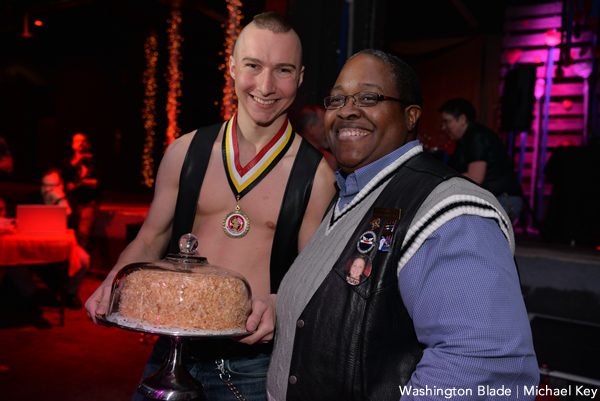
Scarlet’s Bake Sale (Washington Blade photo by Michael Key)
The Blade’s Spring Arts Preview special issue comes out March 2.
The 2018 date has yet to be announced, but the 2017 Al Sura White In Black event was held on March 4. More information soon at alsurainc.org.
The Gay Men’s Chorus of Washington is performing two “Make America Gay Again” concerts on March 17 at the Lincoln Theatre (1215 U Street, N.W.) at 4 and 8 p.m. Tickets are $25-65. All four of the group’s adult ensembles also perform a “Small Ensembles Extravaganza” at the Barns at Wolf Trap (1635 Trap Road, Vienna, Va.) on April 14. “Transamerica,” with special guest artists soon to be announced, is June 2-3 at the Lincoln Theatre (1215 U St., N.W.). Full details and ticket info can be found at gmcw.org.
CAMP Rehoboth Women’s FEST is April 7-10. Details at camprehoboth.com.
Cherry is April 12-15 at various locations. Details at cherryfund.org.
The Equality Virginia Commonwealth Dinner is April 14 at the Greater Richmond Convention Center (403 N. Third Street, Richmond, Va.). Details at equalityvirginia.org.
Dining Out for Life, a Food & Friends benefit, is usually around the third week in April. No details for 2018 yet announced. Look for more information soon at foodandfriends.org.
No details just yet, but the Gay & Lesbian Activists Alliance will host its 47th anniversary reception and annual Distinguished Service Awards sometime in late April. Look for an announcement soon at glaa.org.
Gay Day at the Zoo (3001 Connecticut Ave., N.W.) is May 6 from 12-5 p.m. Details can be found on the event Facebook page.
No information yet, but Youth Pride is usually held the first weekend of May in Dupont Circle, although it was held in October last year. More information soon at youthpridealliance.org.
The Blade’s annual Return to Rehoboth issue comes out May 18 and our Summer Kickoff Party is May 18 at the Blue Moon (35 Baltimore Ave. in Rehoboth).
The Victory Fund National Champagne Brunch is usually held in late May. Check back for more details soon at victoryfund.org.
Trans Pride hasn’t been scheduled yet, but usually takes place in late May. Details soon at capitaltranspride.org.
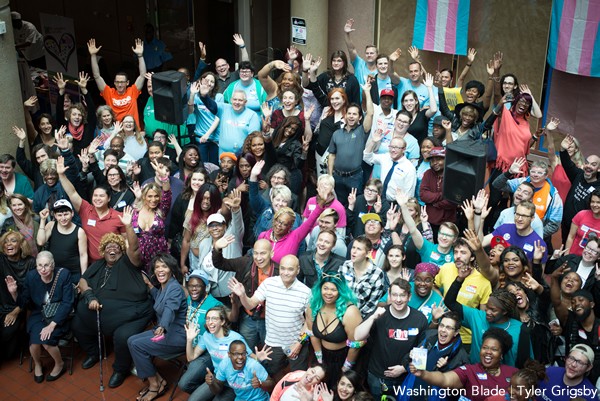
Capital Trans Pride (Washington Blade photo by Tyler Grigsby)
D.C. Black Pride weekend is May 25-28. Details at dcblackpride.org.
If trends continue, the fourth annual Charm City LGBT Film Festival will be in late May. More information soon at creativealliance.org.
The Capital Pride Heroes Gala usually takes place about a week before the Capital Pride opening party in early June. Details soon at capitalpride.org.
The Capital Pride interfaith service is usually slated a day or two before the Capital Pride opening party in early June. Stay tuned for more information at capitalpride.org.
A Capital Pride opening party is planned for June 8.
The Latino GLBT History Project usually holds D.C. Latino Pride events the first and second week in June. Stay tuned for more info soon at latinoglbthistory.org.
Team D.C. always has several Night Out events planned throughout the year. No information yet on 2018 games.
Capital Pride culminates with the parade on June 9 and festival June 10. Many events run in the preceding days. Details at capitalpride.org.
The annual queer music and arts festival PhazeFest was last held July 1 at the 9:30 Club. No word yet on 2018 plans but details will be posted at phazefest.com.
The Blade’s annual Summer in the City issue is published July 13.
Baltimore Pride is June 16 (block party) and 17 (festival). More information soon at baltimorepride.org or the Baltimore Pride Facebook page.
The seventh annual 17th Street Festival will likely be in late August or early September. Check later at 17thstreetfestival.org.
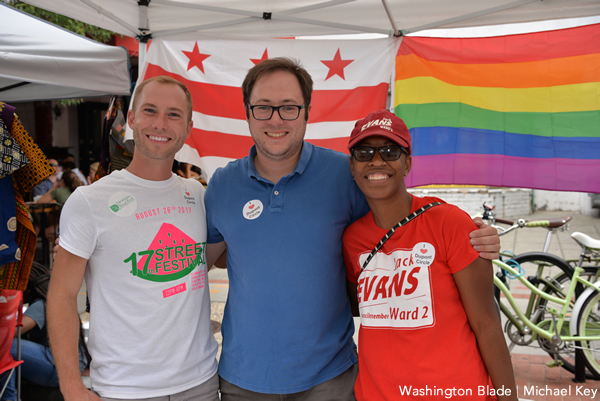
17th Street Festival (Washington Blade photo by Michael Key)
The OutWrite LGBT Book Festival is Aug. 3-4. Details at thedccenter.org/outwrite.
The Blade’s sixth annual Sports Issue will be out Aug. 24.
No information yet, but the Rehoboth Sundance event is held Labor Day weekend. More information soon at camprehoboth.com.
The D.C. Shorts Film Festival is Sept. 6-17. Details at dcshorts.com.
The Imperial Court of Washington holds its Coronation VII “Gala of the Americas” events the weekend of Sept. 7-9. The Court also holds many other events throughout the year. Details at imperialcourtdc.org.
The Blade’s Fall Arts Preview edition is out Sept. 14.
The 22nd annual Human Rights Campaign National Dinner is in October, though the weekend varies from year to year. Details soon at hrcnationaldinner.org.
Baltimore Black Pride is usually the second week of October. Check back for details here.
The Walk & 5K to End HIV is always in late October. More information soon at walktoendhiv.org.
The Blade’s annual Best of Gay D.C. issue is out Oct. 19. The release party will be held Oct. 18.
The 17th Street High Heel Race is always the Tuesday before Halloween. Check back on the event Facebook page.
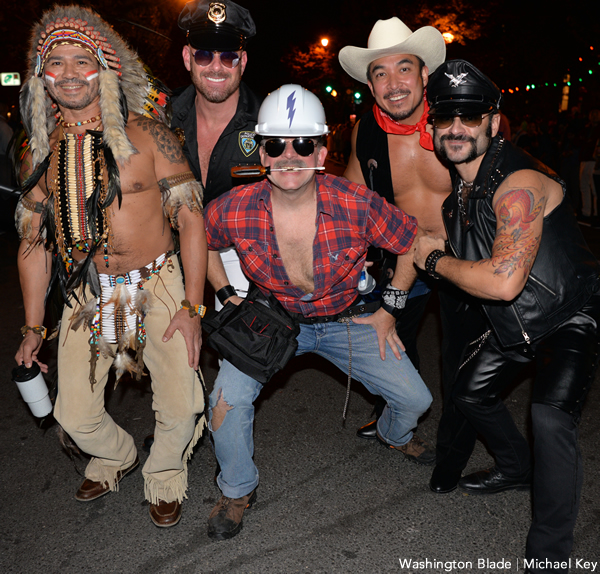
High Heel Race (Washington Blade photo by Michael Key)
The Equality Maryland Signature Brunch is usually in November. More details soon at equalitymaryland.org.
The 21st annual SMYAL fall brunch will be held in early November based on previous scheduling patterns. Check back later at smyal.org.
Transgender Day of Remembrance is Nov. 20. Details at thedccenter.org.
a&e features
Doug Spearman takes his chance
‘Noah’s Arc: The Movie’ debuted on Paramount+ last month

There’s no question that when Patrik-Ian Polk’s series “Noah’s Arc” premiered on Logo 20 years ago, it was a groundbreaking creation. The story of a group of Black gay men and their wonderful friendship. The titular arc was that of the cute main character, Noah (Darryl Stephens), and his close-knit circle of friends, including Chance played by gay actor Doug Spearman. This compelling and loving fraternity may, in fact, be what brought viewers back repeatedly, including a 2008 movie, “Noah’s Arc: Jumping the Broom,” as well as the 2020 “Noah’s Arc” short, and now, a new full-length feature “Noah’s Arc: The Movie,” debuting on Paramount+ on June 20. In the movie, filled with equal measures of laughs and tears, Chance, who has faced a devastating loss, finds his dependable friends there, ready to support and comfort him at a moment’s notice. I had the pleasure of speaking with Spearman the morning of the streaming premiere of “Noah’s Arc: The Movie.”
WASHINGTON BLADE: Doug, since the early 2000s, when the “Noah’s Arc” series premiered on Logo, you have been playing the character of Chance, including in the latest installment, “Noah’s Arc: The Movie.” What was it about Chance that appealed to you as an actor?
SPEARMAN: When Patrik (-Ian Polk) called me to ask me to play him (Chance), I was at JFK airport in the baggage claim, waiting for a suitcase. He explained what the part was. The thing that stuck out to me was the fact that Chance was in a long-term relationship with another Black man. And, they had a child; they had a 4-year-old daughter named Kenya. I had never seen two Black gay men raise a child on TV before. I thought it was the most revolutionary thing I’d ever seen. I immediately thought I’ve got to do this because that was something nobody had seen. I thought it was incredibly important to take the part.
BLADE: “Noah’s Arc: The Movie” was, once again, written and directed by Patrik-Ian Polk, who you just mentioned, is the creator of the entire franchise. What’s the secret to your long-standing working relationship?
SPEARMAN: [Laughs] the whole team, all of us, are like a band of brothers. We fight like brothers, we come together like brothers, we hash things out, we talk, because we’re all very different from our characters. I think the challenge of playing these guys and then uplifting these men, playing a part, especially something written by Patrik, is like solving a math equation. There’s always a challenge that’s enjoyable for me as an actor: to try to find out what it is that Patrik wants, and then how do I do it.
BLADE: I think you do a very good job of it.
SPEARMAN: Thank you very much
BLADE: In the years between “Jumping the Broom” and the new full-length movie, many changes have occurred, and the story addresses some of them, including gay widowhood, which is something that the aging community is now confronting, as well as mental health issues. Please say a few words about how you approached those subjects in the new movie.
SPEARMAN: I had a lot of loss in my life, right before we started shooting. Two months before we started shooting the first series, my mother died. I was going through the grief process through that whole first season. Since then, I’ve lost a lot of people in my life. In fact, when we started shooting the second season, the second week we were shooting, my ex died of a heart attack. I was having to fold that into what I was doing with my life on the set and off the set. You’ve got to show up and you’ve got to do your work. The first two seasons of “Noah’s Arc” are always tinged with the memory of grief. So, when I had to deal with the death that Chance faces (in the new movie), which is a significant death in his life, it wasn’t that hard to reach back, especially the scene in the graveyard. It was something that I unfortunately could pull from personal experience.
BLADE: Shifting gears, the movie features delightful cast surprises, including Jasmine Guy and TS Madison. Did you have a chance to interact with either or both when they were on set?
SPEARMAN: No, I didn’t have any scenes with Jasmine, and I missed her. I wish I had gotten to see her because I actually got to direct Jasmine for a CBS promo shoot for “Queen,” back in the early ‘90s. I had a huge crush on her when she was on “A Different World.” So, I really would have liked to reconnect. But TS and I got to see each other every day because I was in all her scenes. It was extraordinary being around somebody like that. That is one outspoken woman!
BLADE: Even though Beyoncé never makes an appearance in the movie, there’s a lot of talk about her. Would you say you are a Beyoncé fan?
SPEARMAN: Yes! I’m breathing! Yes, I’m a Beyoncé fan. I actually got the chance to meet her. I knew her mom. Her mom was extraordinary to me. She is in the second movie I directed. She also gave us a wedding gown to use in the very first scene of the movie. That family is extraordinarily important to me. Not only just to be a fan, but to be somebody who’s gotten to know them and work with them and see how hard they work. I don’t think anybody works as hard as Tina or Beyoncé.
BLADE: There was a recent news item about gay actor Benito Skinner of the Amazon Prime series “Overcompensating” being told not to bother auditioning for straight roles. As an out actor yourself, how important do you think it is for queer characters to be portrayed by queer actors, and vice versa?
SPEARMAN: Being queer is a multifaceted identity. There’s no one kind of queer person. I think finding the best actor that’s your first circle of casting. I think one of the joys about being an actor is that you get to play different parts. I play straight guys all the time. Dads and husbands and things like that. I think a lot of people are told not to do it. In fact, I wouldn’t be Chance if the actor who was originally cast as Chance hadn’t been pulled out of the series by his agents because they didn’t want him to play a gay character.
BLADE: That’s amazing! Thank you for sharing that. Without giving away too much, the ending of the movie is a little ambiguous, even ending with a question mark. If there was a “Noah’s Arc: The Movie” sequel, would you come back for that?
SPEARMAN: Yeah! A lot of it would depend on what Chance’s journey is going to be like. Patrik and I have conversations like that all the time. He’s very interested and supportive of input. I hope I would be, as we all would be, part of the creative growth with these characters. They live in Patrik’s head, and he writes them, but we’re the ones who have to flesh them out. It’s a conversation, it’s always a conversation.
BLADE: You are currently performing in Molière’s “The Imaginary Invalid” as part of the New Orleans Shakespeare Festival at Tulane. What has this experience been like for you?
SPEARMAN: It’s extraordinary! I started on stage when I was seven. There’s nothing like working with a live audience and having that immediacy. I’m working with an extraordinarily talented cast in a really great play, and I have some of the best scene partners I could ever want.
BLADE: Are there any upcoming film or TV projects you’d like to mention?
SPEARMAN: I’m still a writer, and I’m still a director, and I’ve still got scripts that I would like to make. I have a little something that’s a cross between “Treme” and “Bridgerton” that I want to do. I’m always trying to figure out what the next thing is.
a&e features
Visit Cambridge, a ‘beautiful secret’ on Maryland’s Eastern Shore
New organization promotes town’s welcoming vibe, LGBTQ inclusion

CAMBRIDGE, Md. — Driving through this scenic, historic town on Maryland’s Eastern Shore, you’ll be charmed by streets lined with unique shops, restaurants, and beautifully restored Victorian homes. You’ll also be struck by the number of LGBTQ Pride flags flying throughout the town.
The flags are a reassuring signal that everyone is welcome here, despite the town’s location in ruby red Dorchester County, which voted for Donald Trump over Kamala Harris by a lopsided margin. But don’t let that deter you from visiting. A new organization, Proudly Cambridge, is holding its debut Pride event this weekend, touting the town’s welcoming, inclusive culture.
“We stumbled on a beautiful secret and we wanted to help get the word out,” said James Lumalcuri of the effort to create Proudly Cambridge.
The organization celebrates diversity, enhances public spaces, and seeks to uplift all that Cambridge has to share, according to its mission statement, under the tagline “You Belong Here.”
The group has so far held informal movie nights and a picnic and garden party; the launch party is June 28 at the Cambridge Yacht Club, which will feature a Pride celebration and tea dance. The event’s 75 tickets sold out quickly and proceeds benefit DoCo Pride.
“Tickets went faster than we imagined and we’re bummed we can’t welcome everyone who wanted to come,” Lumalcuri said, adding that organizers plan to make “Cheers on the Choptank” an annual event with added capacity next year.
One of the group’s first projects was to distribute free Pride flags to anyone who requested one and the result is a visually striking display of a large number of flags flying all over town. Up next: Proudly Cambridge plans to roll out a program offering affirming businesses rainbow crab stickers to show their inclusiveness and LGBTQ support. The group also wants to engage with potential visitors and homebuyers.
“We want to spread the word outside of Cambridge — in D.C. and Baltimore — who don’t know about Cambridge,” Lumalcuri said. “We want them to come and know we are a safe haven. You can exist here and feel comfortable and supported by neighbors in a way that we didn’t anticipate when we moved here.”

Lumalcuri, 53, a federal government employee, and his husband, Lou Cardenas, 62, a Realtor, purchased a Victorian house in Cambridge in 2021 and embarked on an extensive renovation. The couple also owns a home in Adams Morgan in D.C.
“We saw the opportunity here and wanted to share it with others,” Cardenas said. “There’s lots of housing inventory in the $300-400,000 range … we’re not here to gentrify people out of town because a lot of these homes are just empty and need to be fixed up and we’re happy to be a part of that.”
Lumalcuri was talking with friends one Sunday last year at the gazebo (affectionately known as the “gayzebo” by locals) at the Yacht Club and the idea for Proudly Cambridge was born. The founding board members are Lumalcuri, Corey van Vlymen, Brian Orjuela, Lauren Mross, and Caleb Holland. The group is currently working toward forming a 501(c)3.
“We need visibility and support for those who need it,” Mross said. “We started making lists of what we wanted to do and the five of us ran with it. We started meeting weekly and solidified what we wanted to do.”
Mross, 50, a brand strategist and web designer, moved to Cambridge from Atlanta with her wife three years ago. They knew they wanted to be near the water and farther north and began researching their options when they discovered Cambridge.
“I had not heard of Cambridge but the location seemed perfect,” she said. “I pointed on a map and said this is where we’re going to move.”
The couple packed up, bought a camper trailer and parked it in different campsites but kept coming back to Cambridge.
“I didn’t know how right it was until we moved here,” she said. “It’s the most welcoming place … there’s an energy vortex here – how did so many cool, progressive people end up in one place?”
Corey van Vlymen and his husband live in D.C. and were looking for a second home. They considered Lost River, W.Va., but decided they preferred to be on the water.
“We looked at a map on both sides of the bay and came to Cambridge on a Saturday and bought a house that day,” said van Vlymen, 39, a senior scientist at Booz Allen Hamilton. They’ve owned in Cambridge for two years.
They were drawn to Cambridge due to its location on the water, the affordable housing inventory, and its proximity to D.C.; it’s about an hour and 20 minutes away.
Now, through the work of Proudly Cambridge, they hope to highlight the town’s many attributes to residents and visitors alike.
“Something we all agree on is there’s a perception problem for Cambridge and a lack of awareness,” van Vlymen said. “If you tell someone you’re going to Cambridge, chances are they think, ‘England or Massachusetts?’”
He cited the affordability and the opportunity to save older, historic homes as a big draw for buyers.
“It’s all about celebrating all the things that make Cambridge great,” Mross added. “Our monthly social events are joyful and celebratory.” A recent game night drew about 70 people.
She noted that the goal is not to gentrify the town and push longtime residents out, but to uplift all the people who are already there while welcoming new visitors and future residents.
They also noted that Proudly Cambridge does not seek to supplant existing Pride-focused organizations. Dorchester County Pride organizes countywide Pride events and Delmarva Pride was held in nearby Easton two weeks ago.
“We celebrate all diversity but are gay powered and gay led,” Mross noted.
To learn more about Proudly Cambridge, visit the group on Facebook and Instagram.
What to see and do
Cambridge, located 13 miles up the Choptank River from the Chesapeake Bay, has a population of roughly 15,000. It was settled in 1684 and named for the English university town in 1686. It is home to the Harriet Tubman Museum, mural, and monument. Its proximity to the Blackwater National Wildlife Refuge makes it a popular stop for birders, drawn to more than 27,000 acres of marshland dubbed “the Everglades of the north.”
The refuge is walkable, bikeable, and driveable, making it an accessible attraction for all. There are kayaking and biking tours through Blackwater Adventures (blackwateradventuresmd.com).
Back in town, take a stroll along the water and through historic downtown and admire the architecture. Take in the striking Harriet Tubman mural (424 Race St.). Shop in the many local boutiques, and don’t miss the gay-owned Shorelife Home and Gifts (421 Race St.), filled with stylish coastal décor items.
Stop for breakfast or lunch at Black Water Bakery (429 Race St.), which offers a full compliment of coffee drinks along with a build-your-own mimosa bar and a full menu of creative cocktails.
The Cambridge Yacht Club (1 Mill St.) is always bustling but you need to be a member to get in. Snapper’s on the water is temporarily closed for renovations. RaR Brewing (rarbrewing.com) is popular for craft beers served in an 80-year-old former pool hall and bowling alley. The menu offers burgers, wings, and other bar fare.
For dinner or wine, don’t miss the fantastic Vintage 414 (414 Race St.), which offers lunch, dinner, wine tasting events, specialty foods, and a large selection of wines. The homemade cheddar crackers, inventive flatbreads, and creative desserts (citrus olive oil cake, carrot cake trifle) were a hit on a recent visit.
Also nearby is Ava’s (305 High St.), a regional chain offering outstanding Italian dishes, pizzas, and more.
For something off the beaten path, visit Emily’s Produce (22143 Church Creek Rd.) for its nursery, produce, and prepared meals.
“Ten minutes into the sticks there’s a place called Emily’s Produce, where you can pay $5 and walk through a field and pick sunflowers, blueberries, you can feed the goats … and they have great food,” van Vlymen said.
As for accommodations, there’s the Hyatt Regency Chesapeake Bay (100 Heron Blvd. at Route 50), a resort complex with golf course, spa, and marina. Otherwise, check out Airbnb and VRBO for short-term rentals closer to downtown.
Its proximity to D.C. and Baltimore makes Cambridge an ideal weekend getaway. The large LGBTQ population is welcoming and they are happy to talk up their town and show you around.
“There’s a closeness among the neighbors that I wasn’t feeling in D.C.,” Lumalcuri said. “We look after each other.”
a&e features
James Baldwin bio shows how much of his life is revealed in his work
‘A Love Story’ is first major book on acclaimed author’s life in 30 years

‘Baldwin: A Love Story’
By Nicholas Boggs
c.2025, FSG
$35/704 pages
“Baldwin: A Love Story” is a sympathetic biography, the first major one in 30 years, of acclaimed Black gay writer James Baldwin. Drawing on Baldwin’s fiction, essays, and letters, Nicolas Boggs, a white writer who rediscovered and co-edited a new edition of a long-lost Baldwin book, explores Baldwin’s life and work through focusing on his lovers, mentors, and inspirations.
The book begins with a quick look at Baldwin’s childhood in Harlem, and his difficult relationship with his religious, angry stepfather. Baldwin’s experience with Orilla Miller, a white teacher who encouraged the boy’s writing and took him to plays and movies, even against his father’s wishes, helped shape his life and tempered his feelings toward white people. When Baldwin later joined a church and became a child preacher, though, he felt conflicted between academic success and religious demands, even denouncing Miller at one point. In a fascinating late essay, Baldwin also described his teenage sexual relationship with a mobster, who showed him off in public.
Baldwin’s romantic life was complicated, as he preferred men who were not outwardly gay. Indeed, many would marry women and have children while also involved with Baldwin. Still, they would often remain friends and enabled Baldwin’s work. Lucien Happersberger, who met Baldwin while both were living in Paris, sent him to a Swiss village, where he wrote his first novel, “Go Tell It on the Mountain,” as well as an essay, “Stranger in the Village,” about the oddness of being the first Black person many villagers had ever seen. Baldwin met Turkish actor Engin Cezzar in New York at the Actors’ Studio; Baldwin later spent time in Istanbul with Cezzar and his wife, finishing “Another Country” and directing a controversial play about Turkish prisoners that depicted sexuality and gender.
Baldwin collaborated with French artist Yoran Cazac on a children’s book, which later vanished. Boggs writes of his excitement about coming across this book while a student at Yale and how he later interviewed Cazac and his wife while also republishing the book. Baldwin also had many tumultuous sexual relationships with young men whom he tried to mentor and shape, most of which led to drama and despair.
The book carefully examines Baldwin’s development as a writer. “Go Tell It on the Mountain” draws heavily on his early life, giving subtle signs of the main character John’s sexuality, while “Giovanni’s Room” bravely and openly shows a homosexual relationship, highly controversial at the time. “If Beale Street Could Talk” features a woman as its main character and narrator, the first time Baldwin wrote fully through a woman’s perspective. His essays feel deeply personal, even if they do not reveal everything; Lucian is the unnamed visiting friend in one who the police briefly detained along with Baldwin. He found New York too distracting to write, spending his time there with friends and family or on business. He was close friends with modernist painter Beauford Delaney, also gay, who helped Baldwin see that a Black man could thrive as an artist. Delaney would later move to France, staying near Baldwin’s home.
An epilogue has Boggs writing about encountering Baldwin’s work as one of the few white students in a majority-Black school. It helpfully reminds us that Baldwin connects to all who feel different, no matter their race, sexuality, gender, or class. A well-written, easy-flowing biography, with many excerpts from Baldwin’s writing, it shows how much of his life is revealed in his work. Let’s hope it encourages reading the work, either again or for the first time.
















